By understanding the academic needs we have prepared the Karnataka State Board English Class 9 Solutions Chapter Wise. Our aim is to help the students by providing the question and answers chapter wise and help them to gain a good score in the exams.. Before you start your preparation go through the chapters covered in this academic. So go through them and Download KSEEB Solutions for Class 9 English Chapter 4 Whatever We Do Question and Answers Pdf for free.
Whatever We Do Questions and Answers, Notes, Summary
The topics covered in Karnataka Secondary Education Examination Board Class 9 Solutions for English Chapter 4 Whatever We Do. The KSEEB Solutions Class 9 English Solutions Chapter 4 Whatever We Do Question and Answers are prepared according to the latest edition.The Chapterwise page will help the students to revise the syllabus during the exams.
Before You Read
Question 1.
Which dialogue do you think is more politely worded? Discuss with your partner.
Answer:
We like the dialogue which are in ‘B’ Section. The words are politely used. Right and kind words are used to express. There are no harsh words. We tine humility in speech.
Check your Comprehension (Share your responses)
Sub Unit From 1 to 5
Question 1.
The author says, “Let us make them better and better.” What does the word ‘them’ stand for here?
Answer:
The word ‘them’ refers to our actions and words.
Question 2.
Imagine that a parent of your friend says, “Work only for the result.” How would you respond to this statement?
Answer:
I would respond to this statement by say ing, “Thank you, sir. Thanks a lot for your kind suggestion.”
Question 3.
3. What are the ways in which we usually thank a person for having helped us?
Answer:
“I am very grateful to you”, or “You have been of great help, I thank you from the bottom of my heart” are some of the ways in which we usually thank a person for having helped us.
Question 4.
How do you react of others make you wait?
Answer:
“Oh! It’s OK”. “It’s pleasure waiting for you”.
Question 5.
Why does the author lay emphasis on adding words to our actions and also adding actions to our words?
Answer:
The author lays emphasis on adding words to our actions and also adding an action to words because we can do better in that way.
Question 6.
What sort of word and what kind of action would make any situation better? .
Answer:
“I am very sorry, giving you some trouble”, “one minute sir, we will finish in no time”. These words make any situation better. Lending a helping hand to others would also make any situation better.
Sub Unit From 6 to 11
Question 1.
How do you think doctors can improve their image with their language?
Answer:
If doctors want to improve their 1 image or jobs, they should talk nicely to their parents. They should think that talking nicely and reassuringly is the part, of treatment. A couple of friendly words from the doctor or even a smile can go along way in making the patient feel better.
Question 2.
What difference do you find in the autorickshaw driver’s response? Discuss.
Answer:
According to the author, we find a difference in the auto-rickshaw drivers’ response, once the author asked a rickshaw, driver, to take him to “City Hospital”. The author did not respond to the author. Simply he downed the metre and started the auto and took the author destination. Here the driver would have been much better if he said.” Yes, Sir, please get in or atleast should have said “Yes” on another occasion he asked another driver to take him to Central Market.” The driver simply responded, “Sorry Sir, it’s time for me to hand over the auto”. Thus we find different responses from autorickshaw drivers. If some autorickshaw drivers say “No”, but it is better if say in a pleasant way.
Question 3.
If we decide to give alms to a beggar, how should we give it?
Answer:
Giving alms to beggars is an ordinary thing. It can be done in a better way. If we decide to give alms to a beggar, we should give it nicely saying, “Here, take this.”
Question 4.
How would public notices need to be changed according to the author?
Answer:
According to the author we have members of public notices, instructions, and orders like “No parking”, “no smoking”, “No Admission”, “Visitors cars not Allowed” and soon. But there terms sound rather tough. They should be changed. At least in case of “No Smoking” should be better changed as “Thank you for Not smoking.” As in the case of “No Parking”, why shouldn’t be added a word like “No Parking Please.”
Question 5.
Pick out any public notice. Try to make it read more politely.
Answer:
We have a number of public notices, instructions and orders like “No Parking”, “No Admission”, “Stop and Proceed”. These notices sound rather touch. If we make them read politely they should be like, “Thank you for Not Parking”, “Thank you for your stopping and proceeding.”
Sub Unit From 12 to 15
Question 1.
What word usually makes our enquiries more polite? Illustrate with one example.
Answer:
A word of good manner usually makes our inquiries polite. For an illustration, suppose we go to a railway station. There we want to enquire about the arrival timing of Nizamuddin Express. We require the Station Master asking “May I know the arrival time of Nizamuddin Express?” or “May I know, when does Nizamuddin Express arrive, please.
Question 2.
Imagine that you are talking to someone on the phone, how would you start the conversation?
Answer:
If I am talking to someone on the phone, I would start the conversation asking politely “May I know who is speaking please?”
Question 3.
Read paragraph-14 carefully. Do you agree with the comparison made there? Discuss.
Answer:
When we speak about saying or doing things better, a question arises about comparison, becuase better usually follows ‘than’. Wise people say that we should compare our selves with our own selves. Here the author says that he should compare his performance of last year and see whether he is doing better or not then.
Question 4.
Why does the author say that there is no formula for the best action or best form of speech?
Answer:
It may be noted that there is no limit to the improvement we can make in our actions or speech. Nor can we say that a particular action or form of speech is the best. What is best may depend on the occasion and it may be possible to continuously make improvements. So the author says that there is no formula for best action or best form of speech.
Think about the Text:
Working in pairs/groups attempt the following:
C1. The author gives a number of instances of expressions that sound odd or unpleasant. Find all such expressions from the text and rewrite them in polite form.
Answer:
The author gives a number of instances of expressions that sound odd or unpleasant.
According to the author in South India, some restaurants are famous for the testy fare they offer. Naturally, they have big rush and it is a problem for the management. In one such restaurant, he saw a board, “Don’t sit for a long time.” This expression sounds odd or unpleasant. This can be rewritten in a polite form as “Please make room for waiting customers” or “Kindly make room for waiting for friends”.
Secondly there are number of notices, instructions and orders, like “No Parking”, “No Smoking”, “No Admission”, “Visitors, cars are not Allowed”. These sound rather rough. They are unpleasant. They can be rewritten in polite manner like “No Parking Please” or Thank you for Not Parking”, Thank you for not Smoking”, “Stop and Proceed” can be rewritten as “Please Stop and Proceed.”
Thirdly people on their phone ask ‘who’s this? This sound odd or unpleasant. This can be asked in a polite form as “May I know who is calling please?”
Fourthly in some restaurants, the waiters usually come and stand near you. They simply Say “Yes Sir” This sounds odd or unpleasant instead of saying so, they may say in a polite way as “May I know Sir, what order can you place please?” Thus the instances of the expressions given by the author can be rewritten in polite manner.
C2. Recall a situation that still makes you feel pleased by the speaker’s words. Why? Discuss.
Answer:
The words of the speaker are polite and they seem to be the best words. They may be of expressing thanks or telling something is a polite way we are glad to know that one method of improving our communication with other is to put you before ‘I’ as for as possible.
C3. How can we react if someone says “no”. Why? Discuss.
Answer:
On many occasions, if the respond is ‘No’, it seems to be odd or unpleasant. Suppose if a person responds ‘No’. When we ask him for a tea or coffee or anything. This response ‘No’ is not a good expression. Atleast he should add some words to ‘No’ like ‘Not thanks’.
If some one says ‘No’ we should react saying. “It’s all right”, “Oh! It’s OK”, ‘Thanks for it.”
Vocabulary
VI. Read the following statements and working in pairs/groups, try to guess meanings of the underlined words from the context:
- Success is a journey not a destination.
- Please make room for waiting customers.
- In posh restaurants, the waiters or stewards do say, “good morning”.
- On a certain occasion I hailed an autorikshaw.
- Some don’t say anything.but try to shun the beggar by their body language.
- And finally when the giving becomes inevitable they give grudgingly.
In South India some restaurants are famous for tasty fare they offer.
Answers:
- Journey – travel
destination – ultimate purpose or place. - make room for – Provide on opportunity
- Posh – high class Stewards – managers
- hailed – saluted.
- Shun – avoid,
- inevitable – unavoidable grudgingly – unwillingly
- tasty fare – ರುಚಿಕಟ್ಟಾದ ಆಹಾರ
V2. (i) Match the words in ‘A’ with their meanings in ‘B’.
Answer:
A B
1. erstwhile – former, previous
2. grateful – feeling or showing thanks
3. flattered – to be pleased when someone praises you
4. shun – avoid, reject
5. grudge – resent
ii) Fill in the blanks in the sentences below with appropriate words or word forms from column A.
Question 1.
Aditi …………… having to pay so much tax.
Answer:
Shuns
Question 2.
Santosh knew Krishna was only ……………… him because he wanted to borrow some money.
Answer:
flattered
Question3.
Vittal’s ……………….. friends turned against him.
Answer:
erstwhile
Question4.
Students have to be ………………. to all the teachers for their help.
Answer:
grateful
Question 5.
Rukmini has ………………. publicity since she retired from the theatre.
Answer:
Shun.
Read and Respond
R1. Read the railway time table given below. Frame as many questions as you can with your partner. Find the answers and discuss.e.g.,
Question 1.
Where does the Howrah Express depart from?
Answer:
The Howrah Express departs from Yashwantpur Junction.
Question 2.
Does Basava Express arrive in Bagalkot at 12.10 p.m?
Answer:
Yes. Basava Express arrives in Bagalkot at 12.10 p.m.
Question 3.
Where does Chalukya Express depart from?
Answer:
The Chalukya Express departs from Yeshwantpur Junction.
Question 4.
Does Chalukya Express arrive in Dadar at 5.00 a.m?
Answer:
No. It arrives in Dadar at 5.50 a.m.
Question 5.
At what time does Vijaypura Yeshwantpura Express depart from Viajaypura?
Answer:
It departs from Vijaypur at 4.50 p.m.
Question 6.
Where does Shatabdi Express go?
Answer:
Shatabdi Express goes to Bengaluru.
S1. Making Suggestions:
Answer:
| Making suggestions | Showing preference |
| 1. Why don’t you read newspapers? | Yes, I could do but I rather read story books. |
| 2. Why don’t eat bananas? | Yes, I could do, but I’d rather eat apples. |
Writing a message
Imagine there is a phone call to your brother, he is not there. Listen to the phone and leave a message/note to your brother.
At 1.30 pm, the phone rings…
Rajesh: Hello, May I speak to Shivaraj?
Sania: Ok, May I know who is calling, please? Rajesh: I’m Rajesh, Shivaraj’s friend.
Sania: That’s fine, but he’s gone out.
Rajesh: Could you please inform him to be the football ground by 5 pm?
Sania: Certainly, I will.
Answer:
“Your friend Rajesh phoned at 1.30 pm. He wants you to be at the football ground at 5 pm.”
The golden eagle
Once a man found an eagle’s egg and placed it under a brooding hen. The eagle hatched with the chickens and grew to be like them. He clucked and cackled: scratched the earth for worms; flapped his wings and managed to fly a few feet in the air. Years passed. One day, the eagle, now grown old, saw a magnificent bird above him in the sky. It glided in graceful majesty against the powerful wind, with scarcely a movement of its golden wings.
Spellbound, the eagle asked “who is that?”
“That’s the king of the birds, the eagle”, said his neighbour. “He belong to the earth – we’re chickens.”
So the eagle lived and died a chicken, for that’s what he thought he was.
Answer the following questions in a sentence or two:
Question 1.
What did the eagle see in the sky?
Answer:
The eagle saw a magnificent bird above him in the sky.
Question 2.
Why do you think the eagle died a chicken? Discuss.
Answer:
The eagle hatched with the chickens and grew with them. He clucked and cackled, scratched the earth for worm one day. The eagle saw a magnificent bird, flying, gliding in a graceful manner against the power of wind. When he enquired his neighbour about that bird he was told, that was the king of the birds, eagle. He belonged to the sky, they belonged to the earth – were chickens. The eagle among the chickens accustomed to the environment of the chickens. Though he was eagle, but he had learnt to live as the chickens did. Therefore the eagle lived and died a chicken for that’s what he thought he was.
Question 3.
What are your limitations-your thoughts or your environments?Reflect and share you partner.
Answer:
It is quite natural that if we live in whatever environment, we accustom to that environment. In case of birds and animals it is the some. The chickens fly a little up. They- cluck, and cackle, scratch the earth for worms. This is their environment. They cannot fly above in the air flapping their wings, as the eagle does. On the other hand the eagle does not have the nature of the chickens. The chicken’s environment is limit to them. They cannot cross this limit.
Here the eagle hatched with the chickens accustomed to the chicken’s environment. Then he never became the eagle, though he had the thought that he was the eagle, but the environment made him he was chicken. So there is limitations our thought or the environment that we live in.
Question 4.
How do you see your real self and break the influence of your environment? Share your views.
Answer:
We should see ourselves as human beings and should live in the environment belongs to us.
A group of good people, having good habits. This is a good environment. We should try to live in such environment. There are different environments. There is a great influence of environment on every man. If the environment of good society, influences us we see ourselves what we are. If the environment of slum area influences us, we see ourselves what we are. In whatever environments we live in, we accustom to it and see then ourselves what we are. It is possible to break out the influence of the environment, but it takes a long time to accustom from one environment to another.
Practice Writing – Group work
Question 2.
You have to attend an important family function tomorrow. Therefore, you will not be able to attend classes. Write a note informing your friend/classmate about this and asking him/her to help you with the lessons/class notes.
Dear Ramu,
I am well here and would like to inform you that I will not be able to attend my classes for a week. There are some important family functions in our home. So I request you to give me your notes next week. Please help me in this regard.
Your loving friends
Raju
Whatever We Do Additional Questions and Answers
Choose the correct answer:
Question 1.
Author says that we can say, progress is a Journey and not a _______
(a) place
(b) award
(c) destination
(d) success.
Answer:
(c) destination.
Question 2.
“You have been of great help. I thank you from the bottom of my heart”
(a) Gratitude
(b) ingratitude
(c) Opinion
(d) affection.
Answer:
(a) Gratitude.
Question 3.
Author says that by adding words to our actions and also adding actions to our words to:
(a) Do better
(b) Help others
(c) Suggest others
(d) Overcome the problems.
Answer:
(a) Do better.
Question 4.
Doctors treating patients can make their jobs much better if they:
(a) Choose to give an injection to patients
(b) Choose to give only tablets
(c) Choose to give advice
(d) Choose to talk nicely to their patients.
Answer:
(d) Choose to talk nicely to their patients.
Question 5.
According to the author, the best and innovative public notice against smoking is :
(a) No smoking
(b) Don’t smoke here
(c) Smoking is prohibited
(d) Thank you for not smoking here
Answer:
(d) Thank you for not smoking here.
Question 6.
We must constantly be on the lookout __________ better performance. The correct preposition to be filled in the blank is :
(a) to
(b) for
(c) by
(d) on.
Answer:
(b) for.
Answer the following questions.
Question 1.
Who is the writer of the lesson “whatever we do?
Answer:
Clifford Martis is the writer of the lesson “whatever we do”.
Question 2.
What is the nice way of saying to the beggars in Mumbai?
Answer:
In Mumbai, people have a nice of saying, “Maph Karo” It is a nice way of saying, “Sorry, I am not able to give”.
Whatever We Do Summary in English
The author of the present lesson “Whatever we do” Clifford Martis. According to the author whatever we do, we should try to do it better. They may be our actions, our words. We should put effort to make them better. We must be aware of better performance. Whenever if we want to express our gratitude, we may say ‘Thanks’’. Still there is a better way to express “Thanks a lot”.
After all it depends upon the time and the situation. Depending upon them we can make it better saying “I am very grateful to you” or “You’ve been of great help and so on. Our communication must be improved in better way. If we want to say someone, it is better to say “I thank you from the bottom of heart.”Once the author bit late to meet a senior person in the company. He tried to make amendments. He said “I am sorry, I made you wait. The senior person said its OK”, and added “It’s pleasure waiting for you.” The author felt flattered because those words were said sarcastically.
There is one way that the author says that we can do better to our actions and also adding actions to our words. He wants to tell an incident, while he was going to his Training Centre. He was waiting for the lift. The lift came down and found two persons. They started to remove the pockets which were fully occupying the lift. After they finished the job the author got into the lift and reached to his Training Centre. There in the class, he mentioned the incident and asked the trainers how the situation would have been rendered. Some trainees said that the two gentlemen while removing the pockets could have said “One minute, Sir” we’ll finish in no time. But another trainee said that he (the author) could have thought of landing a helping hand to them.”
According to author it is said that a couple of friendly words from the doctor even a smile can go a long way in making the patient feel better but most of the doctors cannot do so. They seem to be serious in their works. Talking nicely and reassuringly is a part of doctors’ treatment.
On one occasion, the author asked an auto man to take him to City Hospital. The automan simply looked at him and downed the meter. This indicated that he was willing to take him to his destination. The automan atlea§t would have said to author, “Yes Sir, please sit down”. He did not say so on another occasion he said to another automan to take him to the “Central market”.
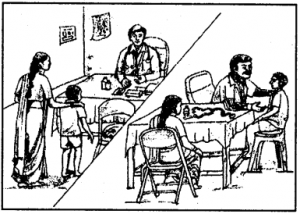
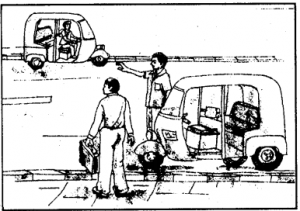
This automan atleast said “Sorry Sir, it’s time for me to hand over the auto. The author pleased for because the automan atleast used the situation make it better.
In giving aims to a beggars can be done in a better way, while giving alms to a beggar it is better to use some nice words with some feeling, we should say “here take this.” This makes beggar feel happy. Some don’t say anything. If he persists, they shun him by their body language. If we want to give alms, our action should be done gracefully. If a beggar asks alms, at least it is better to say “Sorry, I am not able to give. In some hotels, if they are rush they hang a board on the wall that says, “Don’t sit here for long time.” This is really an odd thing to say so. But it is better way to say. “Please make room for waiting customers.” Still i better way to say is “Kindly make room for waiting friends.” At least we should understand to make the situation better.
Now a days telegrams’ place has been occupied by telephone or internet. According to the author the issue of courtesy has not been solved. On mobile or telephone people ask who’s this?” instead of asking “May I know who is calling please?”
The later one solves the issue of Courtesy. This show the courtesy of the speaker who is called on telephone or mobile. The author still says something more about “Thank you”. In the olden days, the people responded “Don’t mention”, when they were said ‘Thank you”. But later in responding to ‘Thank you”, people started using the phrase. “It’s all right”.
Nowadays the respond is “you are welcome” or simply “welcome” one method, the author suggests here is that our communication with other is to put “you” before T as far as possible. If we wish to thank someone for the nice party, we can say, Your party was enjoyable. I thank you”. Another instance, “your letter made me very happy. I thank you. This means here we should try to put “you” that is another person before ‘J‘. According to the author, there is no limit to the improvement that we can make in our action or speech. There is no formula. What is best may depend
on the occasion and it may be possible to continuously make improvement. The most important thing is that we should be aware of the need and importance of doing and saying things better and better.
Whatever We Do Summary in Kannada
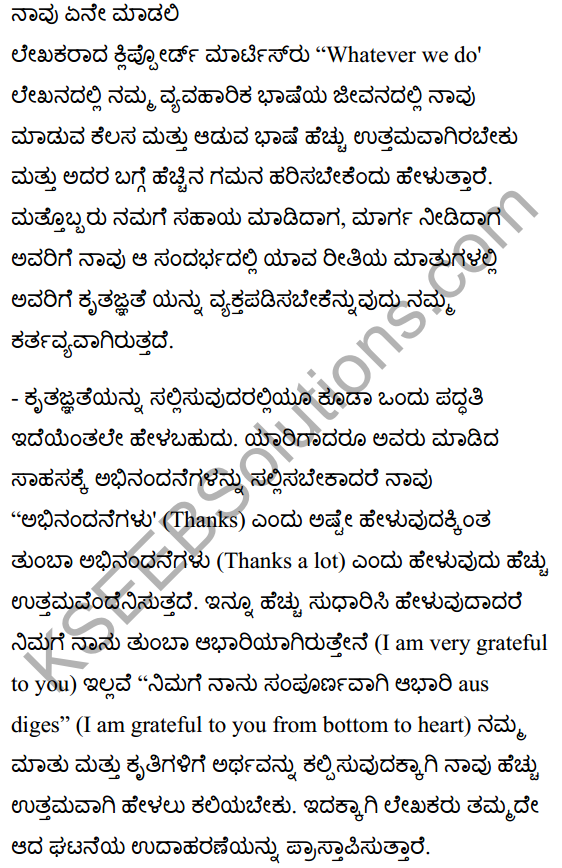
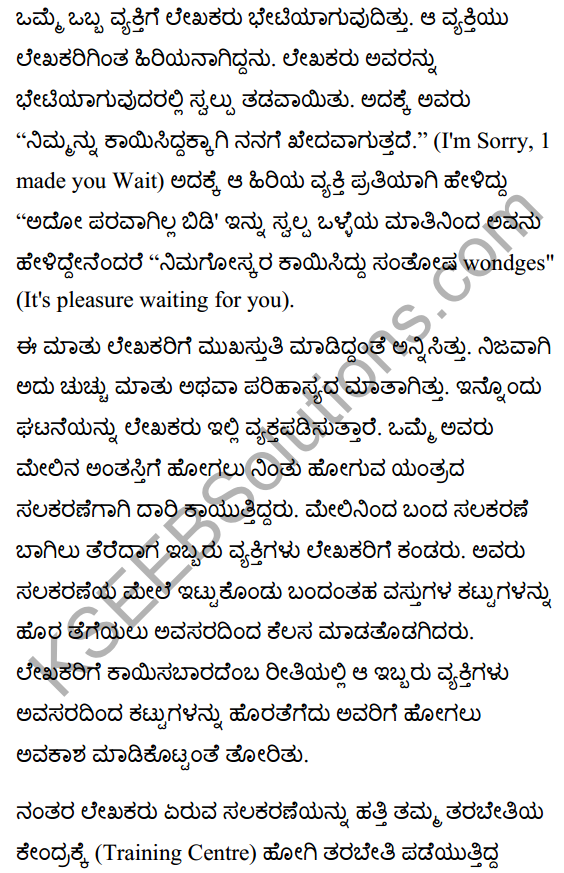
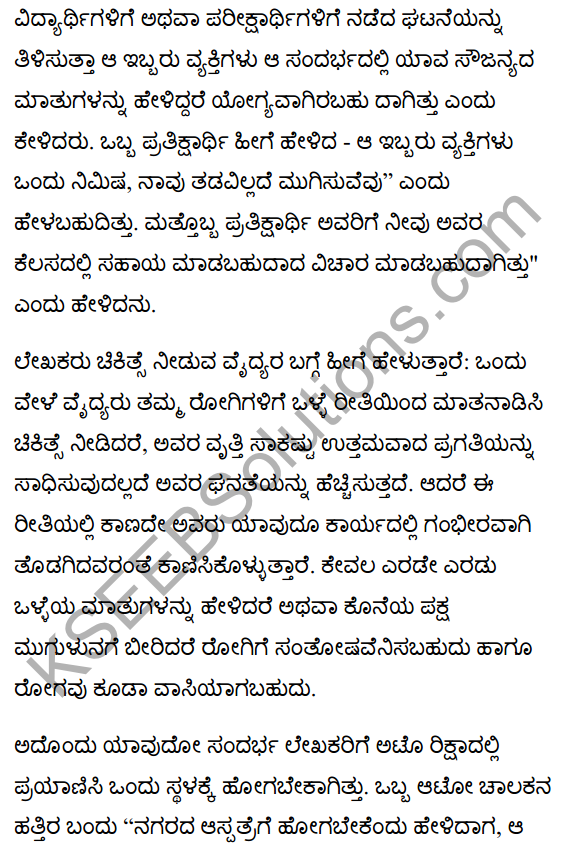
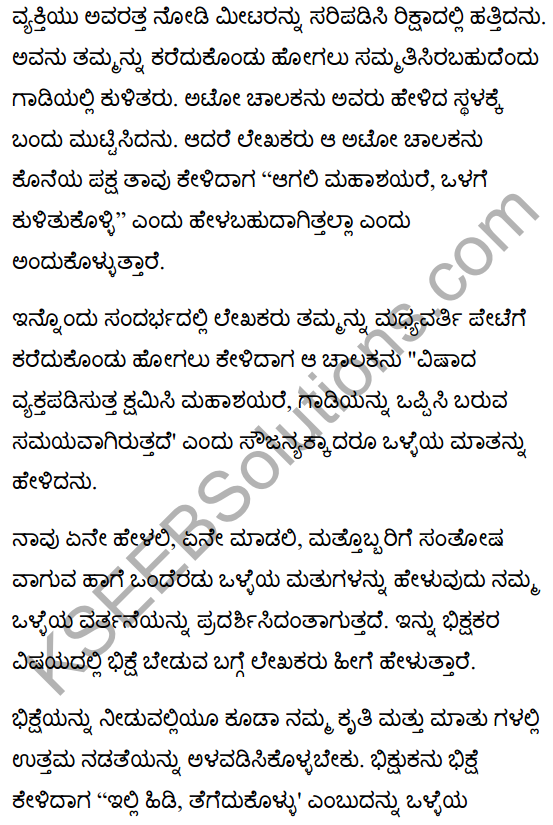
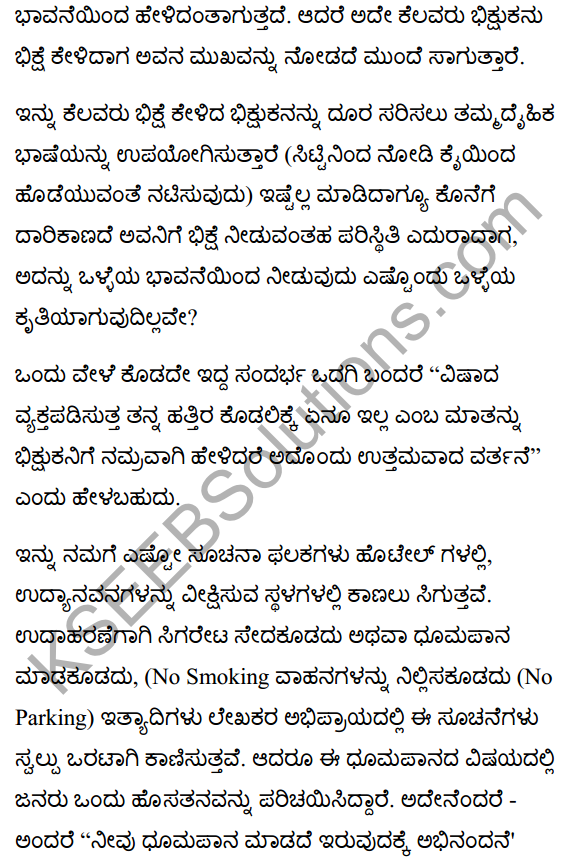
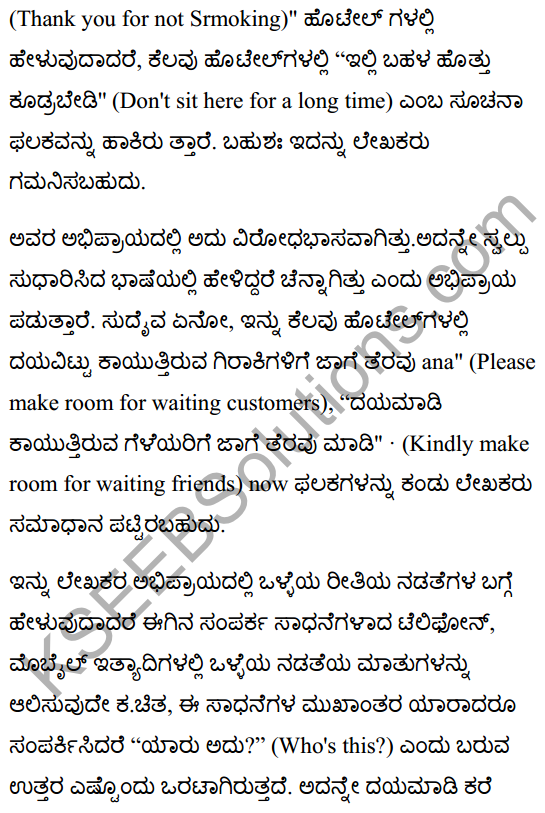
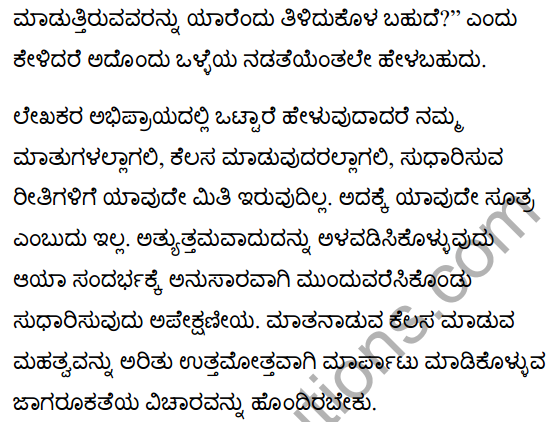
We hope the information prevailed in this article is helpful for all the students of Class 9. The Karnataka State Board Solutions for Class 9 English Chapter 4 Whatever We Do Question and Answers pdf enhance your skills and score good marks in the exams. Stay tuned to get the latest information about the KSEEB Solutions Class 9 English Solutions.